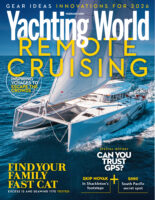Another upwind leg for the seven yachts in the EDS Atlantic Challenge, but this time with a brutal difference. In contrast to the light winds that hobbled the fleet from St Malo to Hamburg, they’ve had a punishing race back down the English Channel in gale force conditions. All but two crews have finished in Portsmouth today exhausted and, in some cases, with a lot of work to do before the next start on Saturday.
Roland Jourdain’s Sill Plein Fruit added another 1st to their overall score, crossing the line this morning at exactly 0300, with Ellen MacArthur’s Kingfisher 54 minutes behind in 2nd place. That repeats the order from the first leg and, with 2/5ths of the race sailed, both are in good shape for an overall win. But it was far from easy. For most of the leg, the fleet was bashing into short and steep seas. ‘The motion is tough going, making the simple task of dialling a phone number take twice as long as normal…’ Ellen MacArthur reported.
She, at least, is familiar with this punishment, having sailed the best part of 50,000 miles in Kingfisher, but many on board are experiencing for the first time what beasts Open 60s can be. “The reality is an extremely bumpy, at times airborne ride,” Miranda Merron managed to report from Mike Golding’s Ecover, though admitting: “It is rather hard to type since nothing will stay put, including the keyboard and mouse.”
The rough conditions have taken their toll on two yachts. Loic Pochet and his crew on La Rage de Vivre retired yesterday to Calais after some keel bolts sheared, while Helena Darvelid and her crew on AlphaGraphics have been in the wars: they’ve been struck by lightning, had a leaking water ballast tank and reportedly had to stab their liferaft to recover it after it inflated. They are expected in Portsmouth this evening.
Late this morning, Josh Hall’s Gartmore was the 3rd boat to finish, beating Mike Golding’s Ecover by a margin of 54 minutes. “We’re a little bit whipped,” Hall confessed, “and the boat has taken a right old pounding. We haven’t done much damage, though – it’s much harder on us than on the boat.”
Hall’s crew managed to hold off Mike Golding on Ecover, but the close competition meant they could not slow up. “To be honest, we would have throttled back in the middle of yesterday when we had a solid 52 knots for a few hours. We had three reefs and a staysail and the storm jib is too small to be competitive, so we just gave it the full welly.”
The stretch through the Dover Strait was, he said, the worst of the leg. “It was pretty rough. I guess the seas were up around 20ft and there were quite a lot of breaking seas.” He says that although he’s seen much bigger seas before in Gartmore, the constraints of this leg narrowed the options of how to deal with them. “In a transocean race you’ve got more freedom of angle of attack on the waves. In mid-ocean you can pay off 5 degrees and make it kinder on the boat. Here all the corners have to be cut.”
Mike Golding agrees that trying to compete on a short leg made it about as tough as it gets. “It was almost survival conditions. The boat’s quite safe, but it weighs nine tons and your smallest area of sail is a storm jib. On a long race, you wouldn’t have the mainsail, but we were sailing with three reefs and a storm sail.
“Everyone is so tired,” he adds. “There were lots of sail changes and with all the tacking through the Dover Strait you couldn’t keep up a watch routine. I actually saw Nigel [King] nodding off with the spoon from a bowl of food halfway to his mouth.”



